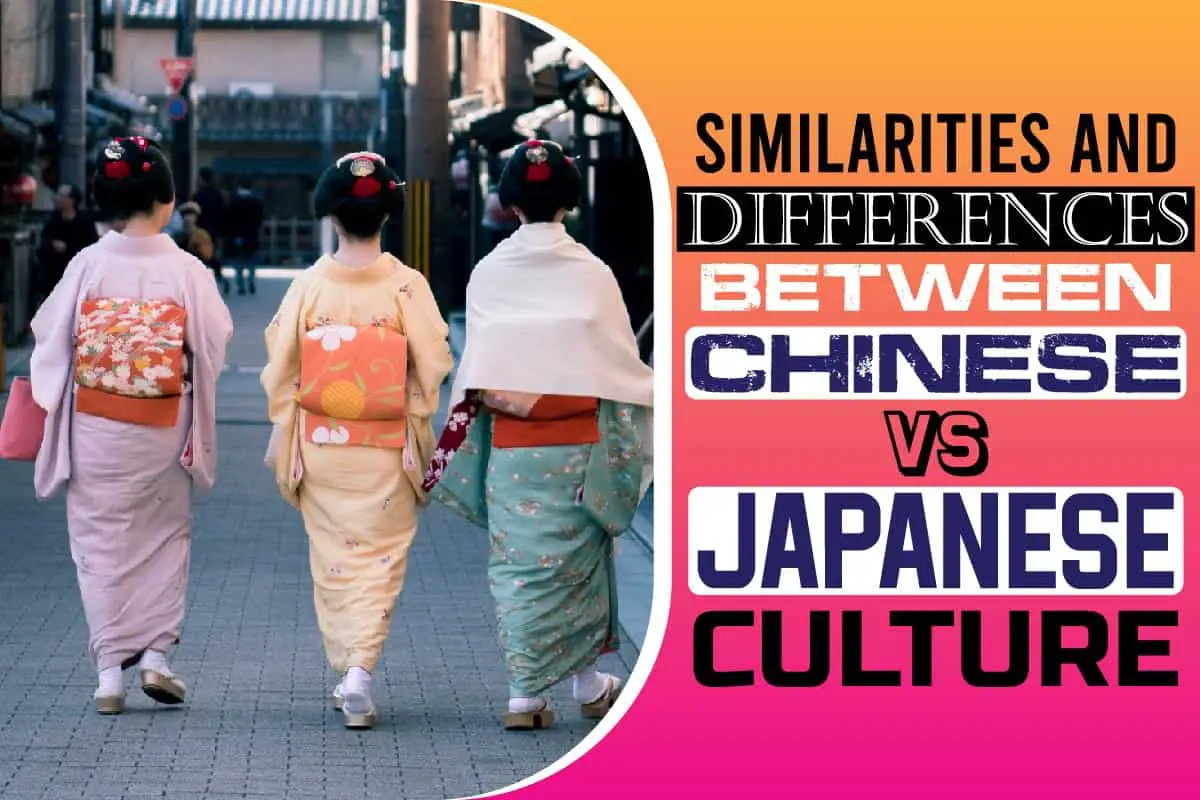One of the misconceptions people have about Chinese vs Japanese culture is that both are the same. This can’t be far from the truth. Although there are many similarities between the cultures of China and Japan, there are significant differences too. We’ll talk about their differences and similarities in this guide.
Similarities And Differences Between Chinese Vs Japanese Culture
China had flourished more in its culture even before Japan started taking influences from it and shaping its cultures accordingly, to some extent. This is the reason why you’ll notice many similarities in both Chinese and Japanese cultures.
But this isn’t always the case. Things have been different as well. Many Japanese cultures are unique and have influenced China as well. Let’s talk about some of the differences and similarities between these two cultures so that you may get a proper idea of them.
Food
China started to have a lot of variations coming from the influence of people of other nations visiting it and immigrating into it. As a result, the cuisine of the foods commonly eaten by the Chinese is super vast. You’d see Mongolian, Indian, Arabian foods everywhere in China. The cuisine range is just huge.
However, because of the influence of other cultures, the foods Chinese people eat are usually cooked with a lot of spices and oil. This is how things have come to be with the influence of various cuisines around the world.
Japan, on the other hand, isn’t so different from China in its food. People usually eat beef, fish, and pork there. They eat a balanced diet with lots of vegetables, boiled, and cooked with very little oil.
Unlike Chinese, Japanese foods are cooked only slightly, most of the time. Foods are cooked to the point that it’s safe to consume without any possible risks. That is the case most of the time. Moreover, it’s common to see people eating raw meat and fish in restaurants, which is considered normal — the less the cooking, the better.
Also, Japanese foods are mostly liquid-based, meaning most of the foods are like soups. Although it’s similar to Chinese foods, many Chinese foods are fried and full of spices, unlike Japanese. Rice and noodle are both common foods in both cultures, along with soup and other fried, spicy foods.
Cleanliness
In terms of being clean, Japan is almost the exact opposite to China. In Japan, littering and throwing dirt on the streets isn’t a common scene. This is a matter of Japanese mindset; they always prefer absolute cleanliness to every part of their lives.
Financial Condition
In general, Japan has been very rich for a long time. China isn’t as rich as Japan yet but developing. The development of China started quite late after Japan, nevertheless.
Most Japanese people enjoy a rich, poverty-free life. This is not to say that there aren’t poor people in Japan. They are richer in general, and the rich are usually very developed financially. This isn’t a common case in China.
Military Policies
Japan has resigned itself to a greater extent from war and other defense-related works. After the second world war, the country has only assigned only 1 percent of its total budget for defense. And that’s the current situation right now. Since Japan is trying to be a peaceful country culture-wise, this decision doesn’t seem unwise.
On the other hand, China has stuffed up on its military power after the same war. Its defense power is currently one of the highest right now, coming only after the United States. While Japan is trying to be more peaceful and focus less on war, China is working on its military strength to have a high defense power.
If Japan wanted, it could focus on its military strength as the people of Japan are hard-working and were able to fix their financial drawbacks after the war within a short time. But Japan focuses on other important aspects related to its cultures that it deemed important. China, however, took a long time to stand on its own.
Language
There are lots of similarities between the Japanese language and its writing style with that of Chinese. The reason is simple: Japan took a lot of motivation from Chinese writing while forming its writing style and shapes.
At that time, Chinese was a very common language of communication, so Japan benefited from that.
Japan has quite a few different writing languages that you’ll notice if you ever visit Japan. However, the spoken language is the same. There are no variations in any context regarding speaking, just a few differences in the way Japanese is written.
China, on the other hand, has a few dialects but a single written language. This is just the opposite of what it is with Japan.
Naming
You’ll notice that Chinese names are usually composed of a few letters — for example, Liu, Kang, etc. On the other hand, Japanese names are longer and have syllables of more than one — for example, Nishimoto, Utsumi, etc. This is just a tradition that has been followed for a long time — an example of continued culture.
House Designs
In the old times, Chinese houses were low in their heights while larger in their widths. The population was very less, and they believed wider houses are more comfortable to live in.
If you’ve visited China in the past, you probably have noticed that almost all the property’s area is covered completely by the house alone. There was hardly any space left outdoors. Chinese people like to have a lot of seating arrangements in their houses, and they prefer more space inside for this reason.
However, times have changed, and the population has increased a lot. Most Chinese buildings nowadays are high-rise and less wide, unlike what it was like in the past. The buildings are built with concrete, which is in stark contrast to the past when most houses were made of wood only.
Persona
Whether you’re talking about Chinese people or Japanese people, one thing you’d find interesting is that both have a mindset of helping others and doing things together. This notion actually helped both of the nations achieve a greater position in the world right now.
It’s a sign of good communication, a better social understanding, and a greater sense of duty towards others. Both Japanese and Chinese try to work in groups to get something done better and within less time.
Japan became one of the most technologically advanced countries in this world by working harder, in groups and with pure dedication. It’s quite the same with China as well. If both populations avoided working in groups and rather focused on working all alone, things could’ve been radically different.
Final Words
When you visit China or Japan, try not to mix up the cultures with one another. Herein, keeping the differences between Chinese vs Japanese cultures in mind helps.
Just follow their basic etiquettes, and you’ll easily have a great influence on all the people you meet there. Cheers!
You May Like These Articles As Well:
What Do You Call A Group Of Deers? Are They Actually Called Herd?
 Being Human
Being Human




